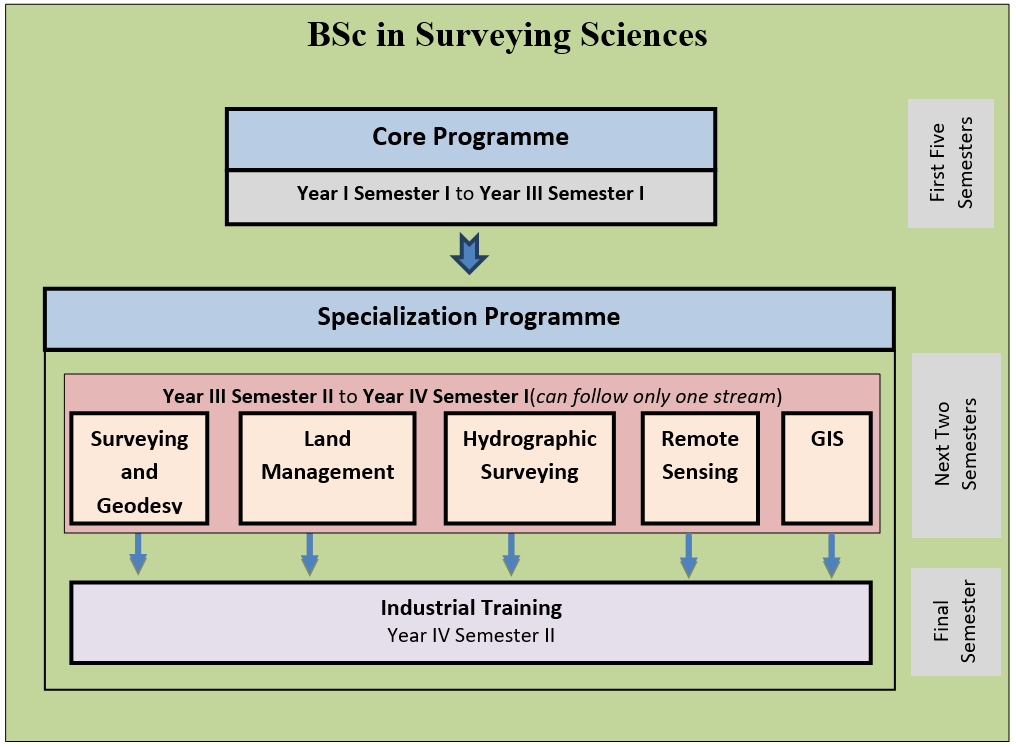Overview
The faculty offers BSc. in Surveying Sciences degree in five areas of specialization. All students entering the faculty must follow the core courses during the first five semesters. Selection for the specialization is done at the end of 3rd year 1st semester, based on personal preference and merit.

Specialization areas
The students can follow the BSc. in Surveying Sciences degree in five specialization areas specified below. The department of Surveying and Geodesy is offers courses in three specialization areas and the department of Remote sensing and GIS offers courses in two specialization areas as indicated below.
|
Specialization area |
Department |
|---|---|
|
Bachelor of Science Honours in Surveying Sciences in Surveying & Geodesy |
Surveying and Geodesy |
|
Bachelor of Science Honours in Surveying Sciences in Land Management |
|
|
Bachelor of Science Honours in Surveying Sciences in Hydrographic Surveying |
|
|
Bachelor of Science Honours in Surveying Sciences in Remote Sensing |
Remote Sensing and GIS |
|
Bachelor of Science Honours in Surveying Sciences in Geographic Information System |
All students entering the faculty must follow the sore courses during the first five semesters. Selection for the specialization is done at the end of 3rd year 1st semester, based on personal preference and merit. According to the Sri Lanka Qualification Framework (SLQF) guidelines, a Bachelor of Science Honours degree needs to offer a minimum of 120 credits. However, as the BScHons (Surveying Sciences) degree is at exit level 7 (SLQF – Sep. 2015), a student needs to complete a minimum of 150 credits to be eligible for graduation. Of these 150 credits, 113 credits come from the common but compulsory core of the programme, with the rest from selected specialization courses.
Study Mode
This Bachelor of Science Honours in Surveying Sciences degree is offered as a full time course by the Faculty of Geomatics, Sabaragamuwa University of Sri Lanka at the main campus situated at Belihuloya. Further the medium of instructions of this course is English. Refer, Faculty Hand Book for the criteria of the selection for specialization.
Selection Criteria for Specialization
The students should apply for specialization, indicating the preferences at the end of the 5th semester. However, if there are more applicants for a course than viable, examination results of the core programme will be considered. Additionally, a student needs to pass all relevant pre-requisite courses from the core programme to be eligible for his/her choice of specialization. The pre-requisite subjects will be decided by each department.
The student has to apply for his/her choice of optional courses, from the courses offered by each department, before the commencement of the new semester. Then, he/she is allowed to add or drop courses until the end of the first week of the semester, if necessary.
At the same time, a student can apply for a greater number of courses than the number of courses required to earn the prescribed minimum number of credits. In this case, the student must choose and specify the courses that are to be counted for the Final Grade Point (FGP), and the grades of the rest of the optional courses will be recorded in the detailed transcript but not counted towards the calculation of the FGP. However, all decisions are subjected to discussion and approval by the Faculty Board of the Faculty of Geomatics.
Refer, Faculty Hand Book for the proposed courses for each semester, with the appropriate number of credits per course.
Duration of study and methods
The duration of the study is:
- Minimum 8 semesters (4 years)
- Maximum 12 semesters (6 years)
The methods of teaching and learning
Directed Learning
| Lectures | Power point presentation/ Conventional delivery methods |
| Practical | Laboratory/ Field/ Demonstrations |
| Tutorial | Discussing and solving problems/questions with students |
| Student Centred Learning (SCL) | Students presenting certain topics in the curriculum, debates, homework, group/individual presentations |
| Seminar | Knowledge imparted by a resource person/expert to a ‘class’ with minimum or no practical component |
| Workshop | Knowledge imparted by a resource person/expert to a ‘class’ with the major portion comprising of hands-on experience |
Independent Learning
| SCL activities | Preparation for SCL activities in class |
| Assignments | Questions/ Quizzes/ Presentations/ Demonstrations/ Debates |
| Projects | Individual/ Group activities involving a certain topic/ activity |
| e-Learning | Use of electronic media, commonly the internet for education |
| Homework | Studies that a student has to do out of the class hours |
| Field visit | Report/ Presentations/ Viva |
| Revision/Preparation for Exams | Working through the entire curriculum by oneself (before the final examination) |
Programme Learning Outcomes (PLOs)
The basic learning outcomes that must be demonstrated by the students at the end of the programme are summarized as follows.
Description of the Learning Programme
(a) Knowledge
- An adequate theoretical knowledge to plan and conduct Geomatics related projects
- Ability to use techniques, skills & modern tools to solve Geomatics related problems effectively & creatively
- To manage geo-spatial data effectively
(b) Skills
- Ability to apply his knowledge and skills to enhance the management of the natural and anthropogenic resources for the sustainable development of the nation
- Ability to think critically and solve problems efficiently
- Ability to lead a team effectively to achieve a common goal
- Ability to communicate effectively
- Ability to apply skills in financial, operational and human resource management
- Ability to apply entrepreneurial skills effectively
(c) Attitudes
- Ability to work independently & in collaboration with others
- Care of instruments and other resources
- Intellectual integrity, respect for truth & for the ethics of research & scholarly activities
- An ability to lead the community and the willingness to accept social & civic responsibilities
- Respect the values of the other individuals and groups, and an appreciation of human and cultural diversity
- Continuous professional and personal development
